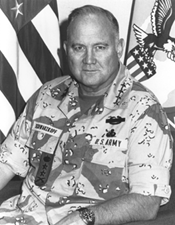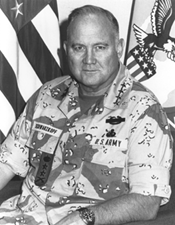A building program is running out of steam. Key leaders have defected and are recruiting others to join their "new" congregation. A major employer in the community has just announced more layoffs—news that portends critical consequences for your church. Sometimes, ministry can be formidable. How do you lead with confidence when you're scared stiff yourself?
Perhaps only a military leader experiences the same anxiety of leading people through the valley of the shadow of doubt and fear. Leadership's Ed Rowell spoke recently with General (Ret.) H. Norman Schwarzkopf about finding the courage to lead.

Schwarzkopf retired from the army in 1991 after serving as Commander in Chief, United States Central Command, and Commander of Operations Desert Shield and Desert Storm.
In a time of crisis, how much should a leader mask his or her fear?
Schwarzkopf: Fear is a natural defense mechanism that sharpens your senses and your wits. It's really an ally that makes you more effective at overcoming the source of your fear. There's no reason to hide your fear if it's rational. What you do need to guard against is allowing fear to paralyze you or cause you to react irrationally. That is the type of fear that causes followers to be concerned. They need reassurance that your judgment has not been overcome by fear, that you are still dealing rationally with the problem. To be frank, if there's a dangerous situation and the leader pretends to be fearless, it will cause people to say, "Wait a minute. This person doesn't realize how dangerous things are. He's liable to sacrifice us needlessly because he doesn't understand." So leaders must demonstrate that they understand the danger and are in command of the situation. The right attitude is, "We will face that which is causing our fear and prevail."
How can a leader instill confidence in people facing a fearful situation?
First, focus on your strengths. I have two dogs. One is a fifteen-pound, wire-haired Dachshund. The other is a ninety-pound German Shepherd. The Dachshund is the leader. Why? Because he has never looked in a mirror. He's not focusing on the fact that he weighs only fifteen pounds. He thinks, I can take on this big dog and prevail. Even though the German Shepherd is bigger by an order of magnitude, the Dachshund doesn't focus on his inadequacies; he focuses on his adequacies. Second, you must somehow impart faith to the people you are leading—faith in you as a leader, but also faith in the cause. Then they must have faith in themselves. And, of course, faith in the Lord, for if the cause is indeed just, he will ultimately prevail. The people who are most inspiring to me are people who have an unshakable belief in the rightness of their mission; they become selfless servants of their mission and their cause. That belief is automatically transferred to their followers. Failure cannot be part of the vocabulary of the extraordinary leader. You must have confidence in yourself, confidence in your team, confidence that no matter how tough the challenge is, We will prevail. That type of attitude can quickly turn around a fearful organization.
That's a common denominator of military leadership and church leadership—in light of the magnitude of the cause, we must appeal to the heroic within people if we expect them to follow.
Right. A person who has to resort to the paycheck or the court-martial in order to get people to follow is no leader. I'd like to think that leadership in the military is much like leadership in the church. It's a calling. It's a belief in serving something other than yourself, serving a higher cause. In our case, it's the cause of duty and honor and country that we are serving; in the case of the church, it's serving the Lord. We used to sing in Sunday school, "I'm in the Lord's army." Do church leaders believe that? No matter how charismatic you may be, if you don't truly believe in your cause, you're never going to convince your followers to believe or participate in it.
Character is the fundamental attribute of great leaders.
There were at least two crisis points in your military career—one not long after you graduated from West Point, another just after Vietnam–when you wondered if a career in the Army was right for you. What got you through those periods of doubt?
I had to remind myself on those occasions that life isn't always easy, it isn't always fair, and nobody ever said it would be. And, oh, by the way, nobody ever said that you had to be happy all the time. Leadership is a series of emotional peaks and valleys. Only if you are lucky will you have more peaks than valleys. If you're into leadership for the next tangible reward, you are doomed to disappointment. The true rewards of leadership come from within. If someday you can look back and say, "We were a great team; I'm proud of what we did together," you'll know the truest reward.
What are the essential qualities of courageous leadership?
Character is the fundamental attribute of all great leaders. It's more important than anything else. Competence is important, certainly, but if you had to sacrifice one, you would give up competence before character. Character is everything. In times of crisis, when people must pick a leader from their peers, they always select the leader based upon character. This thing called "courage" is one ingredient of this thing called "character."
How do you lead, as many pastors must, when you come in as an outsider? For example, you went to Grenada as an adviser, for an invasion that was primarily a Navy exercise, yet were appointed deputy task force commander in just a matter of days.
Initially, my motives were suspect. I think the people involved thought I was there to be the Army spy. So first I had to convince them, "Look, I'm here to help you. I'm here to be a member of the team. My motivation is to help you in any way I can to succeed in this mission." Second, I brought some expertise they sorely needed. Although the invasion was predominantly commanded by the Navy, there were a large number of Army forces involved. The Navy commanders didn't know much about Army capabilities. They turned to me for advice.
Leadership is a series of emotional peaks and valleys.
But they never would have made me deputy commander of the operation if I hadn't convinced them I was there to help them accomplish their mission, that there wasn't anything in this for me. Again, it was character first, then competence.
Desert Storm called for unprecedented speed, mobility, and cooperation of multinational forces. How do you get diverse groups to pull together?
The most important thing about the Gulf War is that we all agreed upon and focused on one, clear objective—to kick Iraq out of Kuwait. Even though we were dealing with a multinational, multicultural, multireligious force, I could always fall back to that point: "What's our mission here?" I've been in some congregations that kind of forgot what their principal mission really was. They ended up having their energies diverted. If leaders establish clear goals, it not only helps keep their organizations focused on what they should do, it also relieves organizations of doing a lot of other stuff they don't need to be doing.
In Vietnam, you faced a persistent opponent that refused to give up. How do you lead when the enemy refuses to surrender?
Sometimes you win a battle by striking a single blow. More often you have to go back and do it over and over again. If you try one approach and it doesn't work, modify your plan and try a different approach. If you're being stopped every time you drive straight ahead, fall back and reexamine the situation. Discover where you have the edge. Use your technological edge, if you have it. Use your mass, if that's what it takes. Use maneuver if it's going to take maneuver to do it. What I'm preaching is another principle of war and of leadership, and that's flexibility. You must never lose sight of your objective, but stay flexible.
Many times a pastor must act decisively even when he or she doesn't have all the facts. How do you assess risk while you're leading on the run?
That is the truest challenge of leadership. You make a plan based upon assumptions. When you get into the execution of your plan, you often find that your assumptions were poor ones, or at least insufficient. At that point, you need to be able to deviate from the plan based on new information. Now, if everybody understands the plan from the outset, you have no problem deviating, because the plan becomes the point of departure from which you can make changes. If nobody understood your initial plan, you have a real problem. Whether we're talking about a spiritual battle or one here on earth, you always have to look at the mission, the enemy, the terrain, and the troops available. You generally know three things if you've done your homework: You know the mission. You know the terrain. You know the resources available.
So the variable, then, is the enemy.
Right. All you can do is make a guess. If you guess wrong, you make the changes necessary based upon what the enemy is doing.
I am struck by the fact that you have had ties to the Middle East since you were 12. Then, years later when Iraq invaded Kuwait, you already had intimate knowledge of the terrain and culture. Did you ever have a sense of destiny, that God prepared you for this moment?
(Long pause.) Well, it certainly is an interesting set of circumstances, isn't it? There's no question that I probably knew more about the Middle East when I was selected for that job than any other four-star general or admiral in the United States military. I was in the Middle East with my dad as a young boy, and that gave me a fascination for that part of the world that other people might not have. As a result, when incidents would occur there, I probably studied them more avidly than the average person. Then years later, when we had to reintroduce the military presence, I happened to be the guy in charge. I wouldn't claim to be chosen by the Lord. I'd just say that somewhere along the way, his hand was working. I think part of being used by God is just the willingness to be used, to say "Here I am; use me."
1997 by the author or Christianity Today/Leadership Journal. For reprint information call 630-260-6200 or contact us.










